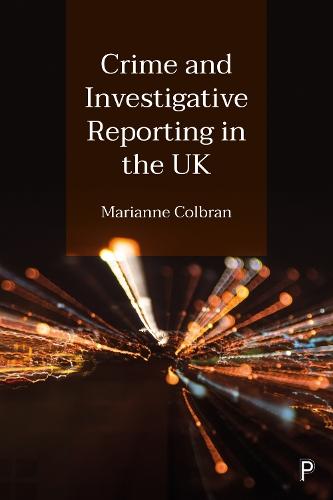Full Product Details
Author: Marianne Colbran (Criminology, London School of Economics)
Publisher: Bristol University Press
Imprint: Policy Press
ISBN: 9781447358916
ISBN 10: 1447358910
Pages: 210
Publication Date: 12 December 2023
Audience:
Professional and scholarly
,
General/trade
,
Professional & Vocational
,
General
Format: Paperback
Publisher's Status: Active
Availability: Manufactured on demand

We will order this item for you from a manufactured on demand supplier.
Reviews
"""The book is skilled at reflecting changing relations between the police, press and public relations. It is a valuable resource for scholars, police and media practitioners worldwide on the changing landscapes of crime, policing and reporting."" LSE Review of Books ""This is a valuable publication for journalism scholars and practitioners mainly due to its wide-ranging list of data from empirical research and theoretical resources. Journalists beyond the UK will identify similar structural problems in their relations with police and challenges in accessing data related to criminal investigations."" Communication Today ""I can claim without any irony that this book meets the criteria for exemplary investigative journalism so often lacking in legacy media reports. Colbran is completely successful in both identifying a gap in scholarship and filling it - this is a timely and signal contribution to cultural criminology, critical criminology and zemiology."" Crime, Media, Culture ""This book delivers on its promise and will resonate with audiences that have a tradition of policing by consent. Colbran is well situated to respond with research into who makes the opening gambit on an increased reciprocity between police and media producers, and how it plays out."" Policing and Society"
""This book delivers on its promise and will resonate with audiences that have a tradition of policing by consent. Colbran is well situated to respond with research into who makes the opening gambit on an increased reciprocity between police and media producers, and how it plays out."" Policing and Society ""I can claim without any irony that this book meets the criteria for exemplary investigative journalism so often lacking in legacy media reports. Colbran is completely successful in both identifying a gap in scholarship and filling it – this is a timely and signal contribution to cultural criminology, critical criminology and zemiology."" Crime, Media, Culture ""The book is skilled at reflecting changing relations between the police, press and public relations. It is a valuable resource for scholars, police and media practitioners worldwide on the changing landscapes of crime, policing and reporting."" LSE Review of Books “This is a valuable publication for journalism scholars and practitioners mainly due to its wide-ranging list of data from empirical research and theoretical resources. Journalists beyond the UK will identify similar structural problems in their relations with police and challenges in accessing data related to criminal investigations.” Communication Today
"""This book delivers on its promise and will resonate with audiences that have a tradition of policing by consent. Colbran is well situated to respond with research into who makes the opening gambit on an increased reciprocity between police and media producers, and how it plays out."" Policing and Society ""I can claim without any irony that this book meets the criteria for exemplary investigative journalism so often lacking in legacy media reports. Colbran is completely successful in both identifying a gap in scholarship and filling it – this is a timely and signal contribution to cultural criminology, critical criminology and zemiology."" Crime, Media, Culture “This is a valuable publication for journalism scholars and practitioners mainly due to its wide-ranging list of data from empirical research and theoretical resources. Journalists beyond the UK will identify similar structural problems in their relations with police and challenges in accessing data related to criminal investigations.” Communication Today ""The book is skilled at reflecting changing relations between the police, press and public relations. It is a valuable resource for scholars, police and media practitioners worldwide on the changing landscapes of crime, policing and reporting."" LSE Review of Books"
"""I can claim without any irony that this book meets the criteria for exemplary investigative journalism so often lacking in legacy media reports. Colbran is completely successful in both identifying a gap in scholarship and filling it - this is a timely and signal contribution to cultural criminology, critical criminology and zemiology."" Crime, Media, Culture ""This book delivers on its promise and will resonate with audiences that have a tradition of policing by consent. Colbran is well situated to respond with research into who makes the opening gambit on an increased reciprocity between police and media producers, and how it plays out."" Policing and Society"
"""This book delivers on its promise and will resonate with audiences that have a tradition of policing by consent. Colbran is well situated to respond with research into who makes the opening gambit on an increased reciprocity between police and media producers, and how it plays out."" Policing and Society ""I can claim without any irony that this book meets the criteria for exemplary investigative journalism so often lacking in legacy media reports. Colbran is completely successful in both identifying a gap in scholarship and filling it – this is a timely and signal contribution to cultural criminology, critical criminology and zemiology."" Crime, Media, Culture ""The book is skilled at reflecting changing relations between the police, press and public relations. It is a valuable resource for scholars, police and media practitioners worldwide on the changing landscapes of crime, policing and reporting."" LSE Review of Books “This is a valuable publication for journalism scholars and practitioners mainly due to its wide-ranging list of data from empirical research and theoretical resources. Journalists beyond the UK will identify similar structural problems in their relations with police and challenges in accessing data related to criminal investigations.” Communication Today"
Author Information
Marianne Colbran is a Research Fellow at the Mannheim Centre for Criminology at the London School of Economics. She is a former scriptwriter for The Bill.




